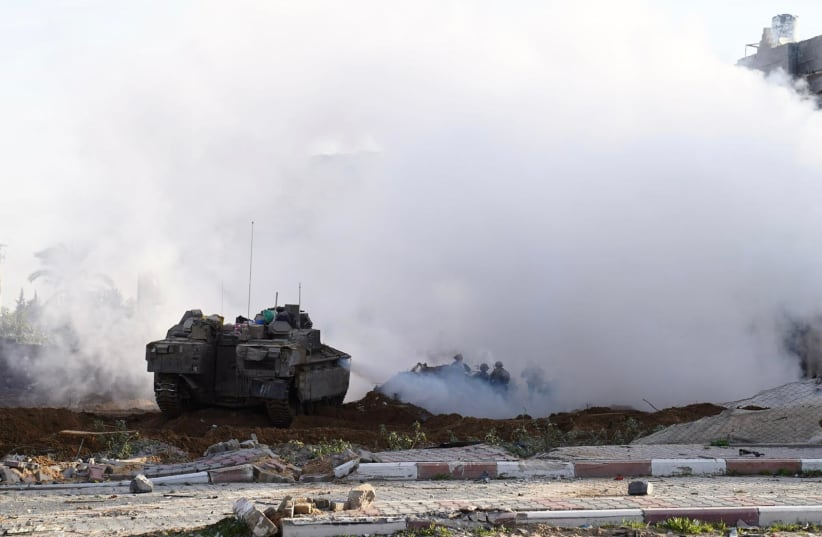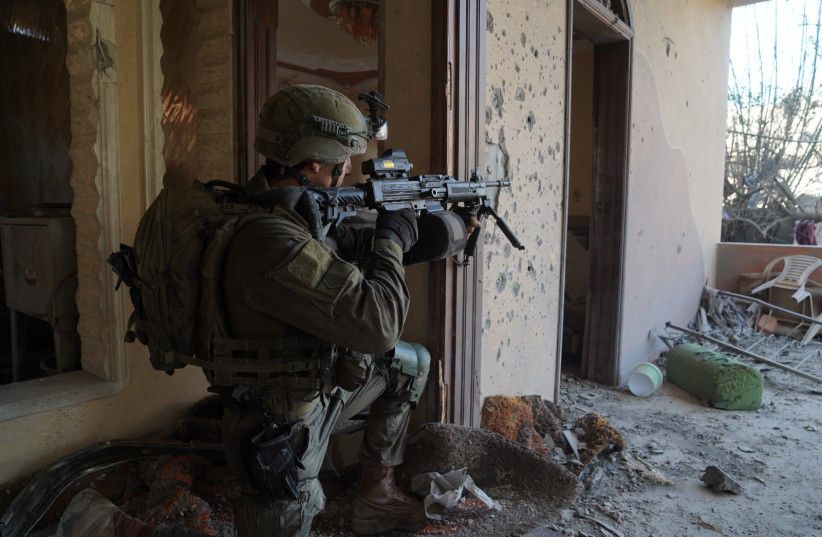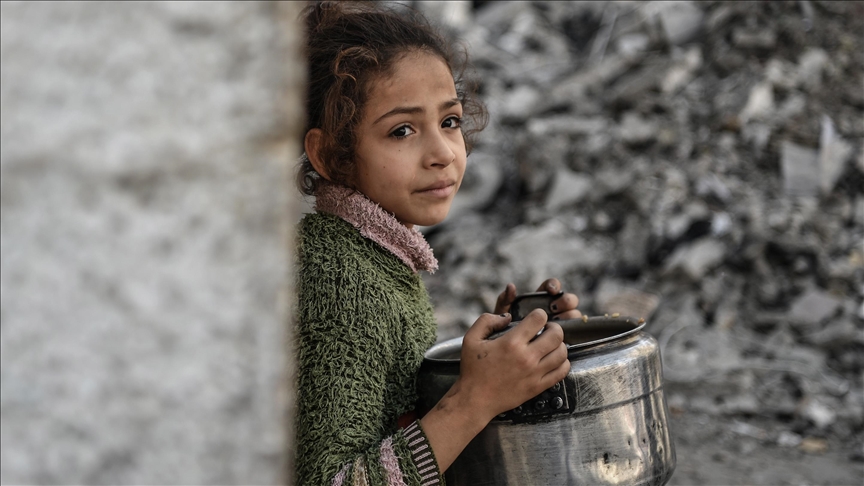Sadly, the war must go on until Hamas is stripped from power - analysis
It must be seen, so the region understands, that Hamas has lost its grip on Gaza and is no longer in control.
It must be seen, so the region understands, that Hamas has lost its grip on Gaza and is no longer in control.

www.jpost.com
By
HERB KEINONJANUARY 16, 2024 22:16
IDF tank operates in Gaza. January 16, 2024.(photo credit: IDF SPOKESPERSON'S UNIT)
On Tuesday, the 102nd day of the war with Hamas, the terrorist organization fired a barrage of 50 rockets toward Netivot.
On Sunday,
Iran’s President Ebrahim Raisi, speaking at an event marking the 100th day of the war, said that “the Zionist regime and its supporters have been defeated.”
Also on Sunday, Hezbollah’s leader Hassan Nasrallah, at a memorial ceremony for a commander of his organization’s elite Radwan force killed last week, boasted that while Israel defeated several Arab armies in six days in 1967, “for 100 days now, they have not been able to achieve victory in Gaza.”
All of the above are the reasons why Israel must continue fighting this war – despite the casualties, even though Hamas is holding more than 100 Israeli hostages, despite the hostages’ unspeakable suffering, and the suffering of their families.
Despite all the sacrifice, pain and agony, Israel must continue to wage this war to free the hostages and destroy Hamas’ military capabilities and its ability to govern the Gaza Strip.
An IDF troop operating in the Gaza Strip. January 16, 2024. (credit: IDF SPOKESPERSON'S UNIT)
If it doesn’t do so; if the country runs out of patience or gives in to Hamas’s demand to end the war and stop the fighting before negotiations can begin over the release of further hostages – negotiations which Hamas can be counted on to drag out for months if not years – then Israel would once again be mortgaging its future for possible short term gain.
This is exactly the type of thinking that led to Hamas having the capabilities to carry out the type of devastating attack it did
on October 7.
For the past 17 years, since Hamas overthrew the Palestinian Authority and took over the Gaza Strip in 2007, Israel avoided a full-blown war with Hamas, sanctifying quiet instead. It tried to push the Hamas issue down the road, hoping that somehow – miraculously – the problem of having a terrorist organization with genocidal intent right on its doorstep would disappear or become manageable.
The same was true in Lebanon. For almost 18 years, since the end of the Second Lebanon War in 2006, Israel turned a blind eye to Hezbollah’s deadly buildup right on its border, not wanting to go to war to prevent Hezbollah from breaching UN Security Council resolution 1701 and arming itself with tens of thousands of missiles. Again, Israel preferred quiet and ignored a massive problem, which only got bigger, rather than take military action to solve it.
As a result, the country finds itself in its current situation – facing the reality of needing to dislodge Hamas from Gaza and Hezbollah from southern Lebanon so that Israeli residents can move back into their homes near the border. It may be tempting to give in to Hamas’s demands to end the nightmare of this war, but the country would pay an unbearable price for this down the line.
Israel must win completely
If this war ends without a conclusive victory for Israel, then all of Israel’s enemies will be emboldened, and its potential friends in the region and around the world will reconsider whether it is worth paying a domestic political price for forging ties with the Jewish state.
The U
nited Arab Emirates, Bahrain, and Morocco, for example, established ties with Israel because it was perceived as a stable, prosperous, technologically advanced country able to defeat and deter its enemies and provide a bulwark against Iran and its proxies. If that perception is dented, then – to borrow Ehud Barak’s term – this “villa in the jungle” called Israel will look far less attractive. More than that, its perceived weakness will invite attacks by unsavory creatures out there in that jungle – one after the next.
Iran’s Raisi and Hezbollah’s Nasrallah, let alone Hamas leader Yahya Sinwar, are going to claim victory no matter what, just as the Egyptians claimed victory after the Yom Kippur War even though the end of the war found Israel within striking distance of Cairo and surrounding the entire Egyptian Third Army in the Sinai.
Hamas will declare victory if, whenever a ceasefire goes into effect, it will be able to fire a single rocket at Sderot. So what Israel needs to do is to defeat Hamas militarily in such a way that no rational person can conclude that the terrorist organization won this war.
What does that mean? It means destroying its military capabilities – and being able to show the world that its military capabilities have been destroyed.
Israel is getting there; the IDF has said that more than 9,000 Hamas terrorists, believed to be about one-third of its fighting force, have been killed, and an equal number wounded. Thousands of rocket launchers and rockets, as well as weapons production facilities, have been destroyed.
But that is not enough, which is why the fighting needs to continue – slowly, systematically, methodically, and with determination.
And then there are the tunnels. A New York Times report on Tuesday described a subterranean fortress with between 250 to 350 miles of tunnels, not bad for a strip of land – as the paper pointed out – only 25 miles in length. That fortress needs to be dismantled, and to do that takes time. Israel cannot stop the fighting with that underground fortress, which took years and hundreds of millions of dollars to construct, still intact. Which means it needs time, and the country needs patience.
Likewise, Israel needs to continue to pursue and kill the organization’s leaders. The killing of Sinwar, Mohammed Deif, and Marwan Issa – or at the very least, their expulsion – would demonstrate Hamas’s defeat, despite all the organization’s attempts to spin it otherwise. This, too, will take time, and for that reason, Israel must continue its military offensive.
If Israel loses its resolve or is pressured by friends to stop now; if Hamas’s military capabilities are not devastated and are not seen by the world to have been devastated, then those Israelis who have had to leave their homes in communities near the Gaza border will not return home. Who can be blamed for not wanting to return to a place where Hamas retains the capabilities to strike again? Which is why Hamas’s ability to attack must be destroyed.
But that is not enough. Hamas also must lose its ability to control Gaza. It must no longer be the authority that controls the distribution of food and humanitarian aid or is in charge of any of the services that are still being provided there.
For that, Israel needs to have a plan for the day after.
Israel has said that the intensive phase of Israel’s ground offensive in northern Gaza has ended. The question then becomes who is going to take over administration of the area, or other areas in Gaza where the IDF has dominance.
If the IDF does not want to do this, then Israel needs to find a body willing and able to do so. And this must be seen, so the region understands that Hamas has lost its grip on Gaza and is no longer in control and that Israel brought the terrorist organization’s administrative reign over the coastal strip to an inglorious end.
Until that is accomplished, and unfortunately, that will take time, the war – for the sake of Israel’s future in the region – must go on.















